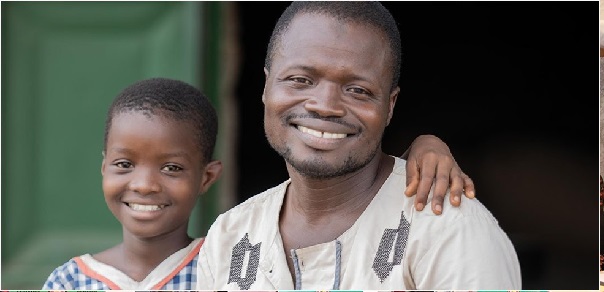A cocoa farmer and his child
Nestlé has announced an innovative plan to tackle child labor risks, increase farmer income and achieve full traceability in the cocoa value chain.
The income accelerator program, aims to improve the livelihoods of cocoa-farming families, while also advancing regenerative agriculture practices and gender equality.
Through the programme a cash incentive will be paid directly to cocoa-farming households for certain activities such as enrollment of children in school and pruning among others.
In a departure from normal practice, the program also offers financial incentives for the farmer’s spouse, who is typically responsible for household expenses and childcare. By dividing the payments between the farmer and the spouse, the program helps empower women and improve gender equality.
Market Head of Nestlé Central and West Africa, Mauricio Alarcon, said, “Child Labor is inacceptable. We are committed to working closely with key stakeholders to ensure that this novel approach will help address its root causes and support farmers and their families to transition to more sustainable cocoa farming in communities where we operate.”
He said Nestlé, through the new plan, would extend its cocoa sustainability initiatives to other parts of Central and West Africa.
These incentives are on top of the premium introduced by the governments of Côte d’Ivoire and Ghana that Nestlé pays and the premiums Nestlé offers for certified cocoa.
“Our goal is to have an additional tangible, positive impact on a growing number of cocoa-farming families, especially in areas where poverty is widespread and resources are scarce, and to help close the living income gap they face over time,” said Mark Schneider, Nestlé CEO.
He said building on Nestlé’s longstanding efforts to source cocoa sustainably, the brand would continue to help children go to school, empower women, improve farming methods and facilitate financial resources.
“We believe that, together with governments, NGOs and others in the cocoa industry, we can help improve the lives of cocoa-farming families and give children the chance to learn and grow in the safe and healthy environment they deserve,” Mr. Schneider added.
Helping farmers implement sustainable, scalable practices Building on the positive results of an initial pilot in 2020 with 1,000 farmers in Côte d’Ivoire, in 2022 Nestlé will expand the program to include 10,000 families in the country, before extending it to Ghana in 2024.
It will then assess the results of that test phase and adapt where necessary, before moving to reach all cocoa farming families in its global cocoa supply chain by 2030.
“By increasing traceability at scale, we will help build consumer trust in our products and respond to the growing demand for responsibly and sustainably sourced cocoa” said Executive Vice President and Head of Operations, Magdi Batato.
By Jamila Akweley Okertchiri


